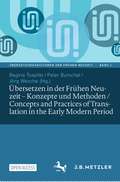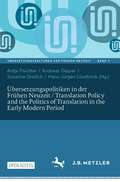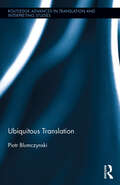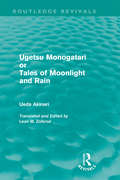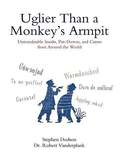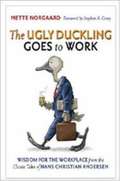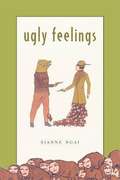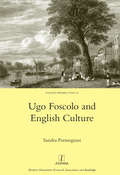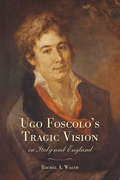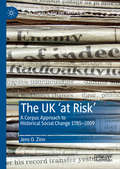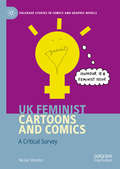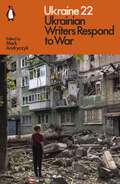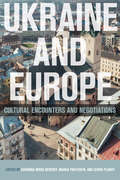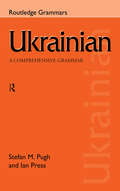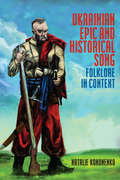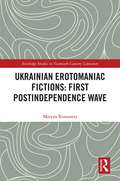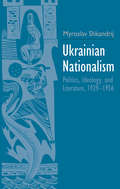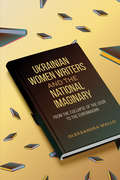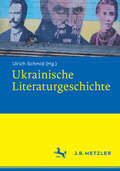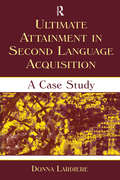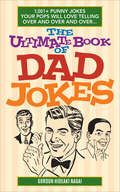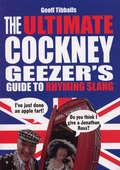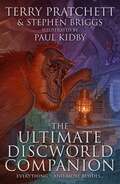- Table View
- List View
Übersetzen in der Frühen Neuzeit – Konzepte und Methoden / Concepts and Practices of Translation in the Early Modern Period (Übersetzungskulturen der Frühen Neuzeit #1)
by Annkathrin KoppersDieser interdisziplinäre Open Access-Band beschäftigt sich mit den vielfältigen Konzepten und Methoden des Übersetzens als zentraler und ubiquitärer Kulturtechnik der Frühen Neuzeit (1450–1800). In fünfzehn Einzelstudien werden gesellschaftliche Leitvorstellungen, Wahrnehmungsmuster und Kommunikationsformen erforscht, die seit dem 15. Jahrhundert durch Praktiken des Übersetzens etabliert werden und bis in die Gegenwart von prägender Bedeutung sind. Behandelt werden etwa jiddische und kymrische Bibelübersetzungen, tamilische und zapotekische Missionstexte sowie französische und arabische Kartenmaterialien. This interdisciplinary open-access collection addresses the multifarious concepts and methods of translation as a central and ubiquitous cultural technique of the Early Modern period (1450–1800). It features fifteen studies on the guiding principles, perception patterns, and communication forms that have taken root in society since the fifteenth century through the practices of translation and are still of defining importance today. The research spectrum encompasses such diverse topics as Yiddish and Cymric translations of the Bible, Tamil and Zapotec mission texts, and French and Arabic cartographic material.
Übersetzungspolitiken in der Frühen Neuzeit / Translation Policy and the Politics of Translation in the Early Modern Period (Übersetzungskulturen der Frühen Neuzeit #3)
by Annkathrin Koppers Felix HerberthAusgangspunkt dieses Konferenzbands im Open Access ist die Frage nach den Bedingungen, die dafür verantwortlich zeichnen, dass überhaupt und in welcher Form in der Frühen Neuzeit übersetzt wird. Anders formuliert geht es um die grundsätzliche Frage danach, warum bestimmte Texte, Bilder, Zeichenkomplexe etc. eine Übersetzung erfahren, während andere unübersetzt bleiben (müssen). Welche Faktoren nehmen schließlich – im positiven Fall – Einfluss auf die konkrete Ausgestaltung von Übersetzung im Sinne des Übertragungsprozesses von einem semiotischen und kulturellen System in ein anderes? In diesem Zusammenhang kommt ein doppeltes Politikverständnis zum Tragen: einerseits geraten Übersetzungspolitik(en) im Sinne des Konzepts der Translation Policy in den Fokus und mit ihnen soziokulturelle, ökonomische und interkulturelle Einflussfaktoren. Andererseits geht es – spezifischer – um Übersetzungen im Kontext politischer Verhandlungs- und Aushandlungsprozesse und somit um den Zusammenhang zwischen Politics und Translation. The point of departure for this conference volume is the question of what conditions are responsible for whether a translation happens at all. Why are certain texts, images, and sign systems translated while others (must) remain untranslated? And what factors influence the form a translation takes in the process of conveying words, images, or signs from one semiotic, cultural system to another? These questions concern both translation policy – that is, the socio-cultural, economic, and intercultural factors that influence translation processes – and the politics of translation in the specific context of political negotiation processes
Ubiquitous Translation (Routledge Advances in Translation and Interpreting Studies)
by Piotr BlumczynskiIn this book, Piotr Blumczynski explores the central role of translation as a key epistemological concept as well as a hermeneutic, ethical, linguistic and interpersonal practice. His argument is three-fold: (1) that translation provides a basis for genuine, exciting, serious, innovative and meaningful exchange between various areas of the humanities through both a concept (the WHAT) and a method (the HOW); (2) that, in doing so, it questions and challenges many of the traditional boundaries and offers a transdisciplinary epistemological paradigm, leading to a new understanding of quality, and thus also meaning, truth, and knowledge; and (3) that translational phenomena are studied by a broad range of disciplines in the humanities (including philosophy, theology, linguistics, and anthropology) using various, often seemingly unrelated concepts which nevertheless display a considerable degree of qualitative proximity. The common thread running through all these convictions and binding them together is the insistence that translational phenomena are ubiquitous. Because of its unconventional and innovative approach, this book will be of interest to translation studies scholars looking to situate their research within a broader transdisciplinary model, as well as to students of translation programs and practicing translators who seek a fuller understanding of why and how translation matters.
Ugetsu Monogatari or Tales of Moonlight and Rain: A Complete English Version of the Eighteenth-Century Japanese collection of Tales of the Supernatural (Routledge Revivals)
by Ueda AkinariUgetsu Monogatari, or Tales of Moonlight and Rain numbers among the best-loved Japanese classics. These nine illustrated tales of the supernatural from eighteenth-century Osaka combine popular appeal with a high literary standard. The author expressed his complex views on human life and society in simple yet poetic language. Akinari questioned the prevailing moral values and standards of his age whilst entertaining his readers with mystery and other-worldly occurrences. This is a reissue of Leon Zolbrod’s definitive English translation of the work, first published in 1974.
Uglier Than a Monkey's Armpit: Untranslatable Insults, Put-Downs, and Curses from Around the World
by Stephen Dodson Robert VanderplankThe most curious, funny, insightful, and expressive invectives from more than forty languages-fully illustrated, you miserable misokakku. "Misokkasu": Scum of soya paste. (Japanese) "Tu es um borra-battos.": You s**t in your own boots. <P><P>(Portugese) "Like a fart in a trance.": A dreamy person who seems at a loss what to do. (Scottish) "A pies ci morde lizal!": Literally, a dog has licked your gob. (Polish) "Prumphaensn.": Fartchicken. (Icelandic) Whether borne out of surprise, anger, passion, or humor, curses and insults make up some of the most colorful and profound phrases in a language. <P>In Uglier Than a Monkey's Armpit, word experts Dr. Robert Vanderplank and Stephen Dodson have scoured the world looking for the most interesting, insightful, and expressive invectives from more than forty languages. These are the words you won't learn in any language class. Arranged by language, containing pointers on gestures, and appropriately illustrated, Uglier Than a Monkey's Armpit (a Spanish phrase to avoid) will equip you with the vocabulary to amuse, shock, offend, and let off steam, wherever you happen to be.
The Ugly Duckling Goes to Work: Wisdom for the Workplace from the Classic Tales of Hans Christian Andersen
by Mette NorgaardFrom the book: Are outer demands for more success, more money, and more prestige overwhelming your inner longings? Is your work no longer energizing you? Years of frenetic activity and blind ambition have robbed many people of the joy and fulfillment they once found in their work. The successes they crave and failures they fear have come to define them. But there is hope, and it can be found in a few simple yet timeless stories. The great Danish writer Hans Christian Andersen succinctly illuminated life's challenges in his treasured fairy tales for children and adults. And now, in celebration of H.C. Andersen's 200th birthday, the powerful lessons of these classic folk tales have been ingeniously applied to the complexities of the modern workplace. The Ugly Duckling Goes to Work probes H. C. Andersen's sharp and witty stories for lessons that will inspire you to bring more meaning, more energy, and more joy to your work -- to create a meaningful work life.
Ugly Feelings
by Sianne NgaiNgai mobilizes the aesthetics of unprestigious negative affects such as irritation, envy, and disgust to investigate not only ideological and representational dilemmas in literature--with a particular focus on those inflected by gender and race--but also blind spots in contemporary literary and cultural criticism. Her work maps a major intersection of literary studies, media and cultural studies, feminist studies, and aesthetic theory.
Ugly White People: Writing Whiteness in Contemporary America
by Stephanie LiWhiteness revealed: an analysis of the destructive complacency of white self-consciousness White Americans are confronting their whiteness more than ever before, with political and social shifts ushering in a newfound racial awareness. And with white people increasingly seeing themselves as distinctly racialized (not simply as American or human), white writers are exposing a self-awareness of white racialized behavior—from staunch antiracism to virulent forms of xenophobic nationalism. Ugly White People explores representations of whiteness from twenty-first-century white American authors, revealing white recognition of the ugly forms whiteness can take. Stephanie Li argues that much of the twenty-first century has been defined by this rising consciousness of whiteness because of the imminent shift to a &“majority minority&” population and the growing diversification of America&’s political, social, and cultural institutions. The result is literature that more directly grapples with whiteness as its own construct rather than a wrongly assumed norm. Li contextualizes a series of literary novels as collectively influenced by changes in racial and political attitudes. Turning to works by Dave Eggers, Sarah Smarsh, J. D. Vance, Claire Messud, Ben Lerner, and others, she traces the responses to white consciousness that breed shared manifestations of ugliness. The tension between acknowledging whiteness as an identity built on domination and the failure to remedy inequalities that have proliferated from this founding injustice is often the source of the ugly whiteness portrayed through these narratives. The questions posed in Ugly White People about the nature and future of whiteness are vital to understanding contemporary race relations in America. From the election of Trump and the rise of white nationalism to Karen memes and the war against critical race theory to the pervasive pattern of behavior among largely liberal-leaning whites, Li elucidates truths about whiteness that challenge any hope of national unity and, most devastatingly, the basic humanity of others. Retail e-book files for this title are screen-reader friendly.
Ugo Foscolo and English Culture
by Sandra Parmegiani"The history of the literary relations between Italy and England has its most celebrated early modern representative in Ugo Foscolo (1778-1827). Foscolo's translation of Laurence Sterne's A Sentimental Journey through France and Italy is often regarded as the benchmark of his English experience, but there is more - around and beyond his relationship with Sterne - that can be uncovered. With over 3,000 letters spanning three decades, Foscolo's correspondence represents a unique perspective from which to monitor his literary, philosophical, and political views. The 'Epistolario' is also a space in which Foscolo engages with literary, philosophical, and moral questions, and a place where he exercises an often private form of literary criticism. These are letters which ultimately produce one of the most complete yet most composite self-portraits in the history of modern Italian autobiography. In the first comprehensive and historicized reading of Foscolo's correspondence, Sandra Parmegiani reveals the rich and complex relations between the Italian writer and the literature, philosophy, and culture of eighteenth- and nineteenth-century England."
Ugo Foscolo's Tragic Vision in Italy and England
by Rachel A. WalshOne of the most celebrated Italian writers of the early Romantic period, Ugo Foscolo (1778-1827) was known primarily as a novelist, a poet, and a nationalist. Following the Napoleonic Wars, he lived in self-exile in England during the last decade of his life. There he wrote numerous critical essays and collaborated with Lord Byron and other well-known members of English literary circles.Ugo Foscolo's Tragic Vision in Italy and England examines an underexplored aspect of Foscolo's literary career: his tragic plays and critical essays on that genre. Rachel A. Walsh argues that for Foscolo tragedy was more than another genre in which to exercise his literary ambitions. It was the medium for an elaborate life-long process of self-examination and engagement with political and literary conflict. By analysing Foscolo's tragic struggles on and off the stage, Walsh sheds new light on his career and how it reflects on the important literary and political trends of the time.
The UK ‘at Risk’: A Corpus Approach to Historical Social Change 1785–2009 (Critical Studies in Risk and Uncertainty)
by Jens O. ZinnThis book presents a case study of the proliferation of at risk-language in The Times news coverage from 1785 to 2009, illuminating the changing social experience of risk. Zinn presents an historical examination of the forces which have shaped the language of risk over time, and considers how linguistic developments in recent decades are underpinned by issues such as cultural and structural transformations, the management of infectious and chronic diseases and climate change. He also explores changes in the public sphere, including the production of the news. Based on an interdisciplinary research project which combines linguistic research tools with sociological analysis of the social contexts, the book contributes to a better understanding of how 'at risk' has become a defining feature of the UK in recent decades, and one which permeates all kinds of social domains. This research will be a point of reference for students and scholars engaging with risk studies from various disciplines including sociology, media studies, history and socio-linguistics.
UK Feminist Cartoons and Comics: A Critical Survey (Palgrave Studies in Comics and Graphic Novels)
by Nicola StreetenThis book demonstrates that since the 1970s, British feminist cartoons and comics have played an important part in the Women’s Movement in Britain. A key component of this has been humour. This aspect of feminist history in Britain has not previously been documented. The book questions why and how British feminists have used humour in comics form to present serious political messages. It also interrogates what the implications have been for the development of feminist cartoons and for the popularisation of feminism in Britain. The work responds to recent North American feminist comics scholarship that concentrates on North American autobiographical comics of trauma by women. This book highlights the relevance of humour and provides a comparative British perspective. The time frame is 1970 to 2019, chosen as representative of a significant historical period for the development of feminist cartoon and comics activity and of feminist theory and practice. Research methods include archival data collection, complemented by interviews with selected cartoonists. Visual and textual analysis of specific examples draws on literature from humour theory, comics studies and feminist theory. Examples are also considered as responses to the economic, social and political contexts in which they were produced.
Ukraine 22: Ukrainian Writers Respond to War
by Mark Andryczyk'The extraordinary writers in this volume articulate the taste, the terror, and the dialect of war; they command their powers of description to face a shameless empire intent on annihilating them' Ellena SavageA selection of Ukraine's leading writers convey the reality of life within Ukraine during the first year of the invasionOn 24 February 2022, the lives of Ukrainians were devastatingly altered. Since that day, many of Ukraine's writers have attempted to fathom what is happening to them and to their country. This anthology brings together writing from inside Ukraine, by Ukrainians, available in English for the first time. Here they document everyday life, ponder the role of culture amid conflict, denounce Russian imperialism and revisit their relations with the world, especially Europe and its ideals, as they try to comprehend the horrors of war.From tearing-downs of Russia's use of culture as justification of the war to moving descriptions of nights spent sheltering in corridors, poignant snatched moments with a husband on his single night away from the army, to descriptions of the eerie weather in the months leading up to the invasion, as if nature was trying to warn Ukraine, these essays reveal the texture, rawness and reality of life in Ukraine under war as never before.
Ukraine and Europe: Cultural Encounters and Negotiations
by Giovanna Brogi Bercoff Marko Pavlyshyn Serhii PlokhyUkraine and Europe challenges the popular perception of Ukraine as a country torn between Europe and the east. Twenty-two scholars from Europe, North America, and Australia explore the complexities of Ukraine’s relationship with Europe and its role the continent’s historical and cultural development. Encompassing literary studies, history, linguistics, and art history, the essays in this volume illuminate the interethnic, interlingual, intercultural, and international relationships that Ukraine has participated in. The volume is divided chronologically into three parts: the early modern era, the 19th and 20th century, and the Soviet/post-Soviet period. Ukraine in Europe offers new and innovative interpretations of historical and cultural moments while establishing a historical perspective for the pro-European sentiments that have arisen in Ukraine following the Euromaidan protests.
Ukrainian: A Comprehensive Grammar (Routledge Comprehensive Grammars)
by Ian Press Stefan PughUkrainian: A Comprehensive Grammar is a complete reference guide to modern Ukrainian grammar.The authors have consulted a great number of sources, in addition to a wide range of native speakers. The result is the first true reference grammar of Ukrainian to be published outside Ukraine, it will be the standard reference work for years to come.The volume is organized to enable students of the language to find the information they seek quickly and easily, and to promote a thorough understanding of Ukrainian grammar. It presents the complexities of the language in a systematic and user-friendly form.Features include* detailed tables in each chapter for easy reference* numerous examples throughout* thorough descriptions of all parts of speech* list of grammatical terms in English and Ukrainian* complete descriptions of the word-formational processes of Ukrainian* an overview of past and present changes in the language* bibliography of works relating to Ukrainian* full index.
Ukrainian Epic and Historical Song: Folklore in Context
by Natalie KononenkoUkrainian epic, or dumy, were first recorded from blind mendicant minstrels in the nineteenth century. Yet they reflect events dating back to as early as the 1300s. Ukrainian Epic and Historical Song provides new translations in contemporary English. It also explains the historical events celebrated in epic and other historical songs: fierce battles, rebellion against tyranny, the struggles of captivity, the joys of escape from slavery. Natalie Kononenko’s expert translation and analysis of Ukrainian epics provides a sweeping social history of folklore that is vital to Ukrainian identity. A translation of at least one variant of every known epic is included. Whereas earlier trends in folklore scholarship emphasized genre purity and compartmentalization, Kononenko critically examines the events about which songs were sung. Her emphasis on the lives of ordinary people rather than on leaders reshapes our understanding of how epics were composed and performed. Kononenko’s ground-breaking analysis also illuminates Ukrainian self-understanding and explains how songs preserve and perpetuate historical memory. Scholars interested in epic song, history, and general folklore will benefit from this work. Members of the Ukrainian diaspora will find new appreciation of Ukrainian folklore.
Ukrainian Erotomaniac Fictions: First Postindependence Wave (Routledge Studies in Twentieth-Century Literature)
by Maryna RomanetsUkrainian Erotomaniac Fictions explores the aggressive sexualization of the Ukrainian cultural mainstream after the collapse of the USSR as a counter-reaction to the Soviet state's totalitarian, repressive politics of the body. While the book's introduction includes concise sections on such pornified cultural forms as advertising, mass media, visual art, and film, its major focus is on textual production that has contributed significantly to the literary explosion in Ukraine, which began in the 1990s. Drawing on cultural, postcolonial, feminist, and gender theories, the book examines transgressive potentials of the erotic under postcolonial, postcommunist, and post-totalitarian conditions. It offers insight into the convoluted dialectics between the imported conventions of Western "porno-chic" and the received oppressive Soviet gender and sexual ideologies. Within a broad historical and cultural framework, the study considers writers' engagements in dialogues with their own tradition and colonial legacy, as well as with a variety of transcultural flows. By bringing together diverse erotomaniac fictions, Maryna Romanets charts the ways in which they are embedded in the processes of Ukraine's cultural decolonization.
Ukrainian Nationalism
by Myroslav ShkandrijBoth celebrated and condemned, Ukrainian nationalism is one of the most controversial and vibrant topics in contemporary discussions of Eastern Europe. Perhaps today there is no more divisive and heatedly argued topic in Eastern European studies than the activities in the 1930s and 1940s of the Organization of Ukrainian Nationalists (OUN). This book examines the legacy of the OUN and is the first to consider the movement's literature alongside its politics and ideology. It argues that nationalism's mythmaking, best expressed in its literature, played an important role. In the interwar period seven major writers developed the narrative structures that gave nationalism much of its appeal. For the first time, the remarkable impact of their work is recognized.
Ukrainian Women Writers and the National Imaginary: From the Collapse of the USSR to the Euromaidan
by Oleksandra WalloSince the collapse of the Soviet Union, the Ukrainian literary world has not only experienced a true blossoming of women’s prose, but has also witnessed a number of female authors assume the roles of literary trendsetters and authoritative critics of their culture. In this first in-depth study of how Ukrainian women’s prose writing was able to re-emerge so powerfully after being marginalized in the Soviet era, Oleksandra Wallo examines the writings and literary careers of leading contemporary Ukrainian women authors, such as Oksana Zabuzhko, Ievheniia Kononenko, and Maria Matios. Her study shows how these women reshaped literary culture with their contributions to the development of the Ukrainian national imaginary in the wake of the Soviet state’s disintegration. The interjection of women’s voices and perspectives into the narratives about the nation has often permitted these writers to highlight the diversity of the national picture and the complexity of the national story. Utilizing insights from postcolonial and nationalism studies, Wallo’s book theorizes the interdependence between the national imaginary and narrative plots, and scrutinizes how prominent Ukrainian women authors experimented with literary form in order to rewrite the story of women and nationhood.
Ukrainische Literaturgeschichte
by Ulrich SchmidDer offene Überfall Russlands auf die Ukraine im Februar 2022 hat der westlichen Öffentlichkeit die Wichtigkeit der ukrainischen Kulturgeschichte bewusst gemacht. Es mangelt allerdings an grundlegenden Handbüchern. Auf Deutsch liegt keine ukrainische Literaturgeschichte vor, die einen Überblick über die wichtigsten Autorinnen und Autoren sowie die Entwicklung der literarischen Genres geben würde. Es gibt eine Reihe von Fragen, der sich eine ukrainische Literaturgeschichte stellen muss. Wann und mit welchen Texten beginnt die Geschichte der ukrainischen Literatur? In welchen Sprachen und in welchem Raum vollzieht sie sich? Welche regionalen Besonderheiten sind zu beachten? Welche institutionellen Bedingungen ermöglichen und behindern den literarischen Prozess in der Ukraine? Schließlich ist noch auf ein wichtiges Spezifikum hinzuweisen. Eine ukrainische Literaturgeschichte kann keine Darstellung eines literarischen Prozesses sein, der unabhängig von seiner eigenen Reflexion, Historisierung und Institutionalisierung abläuft. Mit anderen Worten: Die ukrainische Literaturgeschichte „entstand“ nicht einfach, sondern sie wurde über weite Strecken als gewollte kulturelle Ordnung konstruiert.
Ulrike Meinhof and the Red Army Faction
by Leith PassmoreWith a communicative approach to the phenomenon of terrorism and new archival sources, the book documents Meinhof's journalism and terrorism (1959-1976) and challenges many of the established narratives that have calcified around the story of Meinhof and the history of Germany's most infamous terrorist group.
Ultimate Attainment in Second Language Acquisition: A Case Study
by Donna LardiereThe first book-length treatment of its type, Ultimate Attainment in Second Language Acquisition is a case study with a solid theoretical grounding that examines the language of an immigrant learner of English, and thereby presents a much needed understanding of the linguistic competence of second language speakers. Based on longitudinal data collected over a period of 16 years, this clear and accessible presentation is well-grounded in linguistic theory and in second language acquisition research issues. Author Donna Lardiere presents the narrative of Patty, an adult Chinese immigrant learner of English, who achieves native-like proficiency in some areas of her English idiolect, although reaches a plateau in her language acquisition, known as the concept of fossilization. By addressing this concept, a central idea in second language acquisition research, Lardiere fills a void in existing literature. Individual chapters focus on Patty’s end state knowledge of grammatical areas of finiteness, past-tense marking, word order, wh-movement and relativization, passivization, number marking, and use of determiners. Important topics discussed throughout the book include:*learner variability in production;*case study methodology;*the roles of motivation and prior language (L1) knowledge; and*sensitivity to input in circumscribing ultimate attainment in adult second language acquisition. Ultimate Attainment in Second Language Acquisition is intended for anyone whose research is in the areas of second language acquisition, language acquisition, theoretical, applied, or developmental linguistics. It is also appropriate for graduate level students of TESOL and teachers who work with more advanced learners of foreign languages.
The Ultimate Book of Dad Jokes: 1,001+ Punny Jokes Your Pops Will Love Telling Over and Over and Over . . .
by Gordon Hideaki NagaiA MASSIVE COLLECTION OF LAUGHABLE, CHEESY JOKES PERFECT FOR AMUSING DADS WHILE SLIGHTLY EMBARRASSING THE KIDS As groan-inducing as they are hilarious, dad jokes are the punny one-liners and oh-so-clever quips fathers never tire of telling. With this massive collection, no Dad will ever lack new material to make his kids facepalm: • A watermelon and a honeydew wanted to get married right away, but they cantaloupe. • After Humpty Dumpty recovered from his fall, he was just a shell of his former self. • Sign language interpreters have to lean sideways to translate something in italics. • Anyone with a wheat allergy that routinely eats pasta is just a gluten for punishment. • A chord walked into a bar and ordered a drink. The bartender said, &“We don&’t serve minors.&”
The Ultimate Cockney Geezer's Guide to Rhyming Slang
by Geoff TibballsWould you Adam and Eve it? Over a hundred years after it was first heard on the streets of Ye Olde London Towne, Cockney rhyming slang is still going strong, and this book contains the most comprehensive and entertaining guide yet.Presented in an easy-to-read A to Z format, it explains the meaning of hundreds of terms, from old favourites such as apples and pears (stairs) and plates of meat (feet) to the more obscure band of hope (soap) and cuts and scratches (matches) through to modern classics such as Anthea Turner (earner) and Ashley Cole (own goal), as well as providing fascinating background info and curious Cockney facts throughout. Also included are a series of language tests so that readers can brush up on their newfound knowledge on their way to becoming a true Cockney Geezer.All in all, The Ultimate Cockney Geezer's Guide to Rhyming Slang is well worth your bread and honey to have a butcher's.
The Ultimate Discworld Companion
by Terry Pratchett Stephen BriggsThe absolute, comprehensive, from Tiffany Aching to Jack Zweiblumen guide to all things Discworld, fully illustrated by Paul Kidby.The Discworld, as everyone knows, is a flat world balanced on the back of four elephants which, in turn, stand on the shell of the giant star turtle, the Great A'Tuin, as it slowly swims through space.It is also the global publishing phenomenon with sales of over 70 million books worldwide (but who's counting?). There's an awful lot of Discworld to keep track of. But fear not! Help is at hand. For the very first time, everything (and we mean everything) you could possibly want to know has been crammed into one place.If you need a handy guide to locales from Ankh-Morpork to Zemphis . . .If you can't tell your Achmed the Mads from your Jack Zweiblumens . . .If your life depends on distinguishing between the Agatean Empire and the Zoons . . .Look no further. Updated and perfected by Stephen Briggs, the man behind The Ultimate Discworld Companion's predecessor Turtle Recall, this is your ultimate guide to Sir Terry Pratchett's beloved fantasy world.
